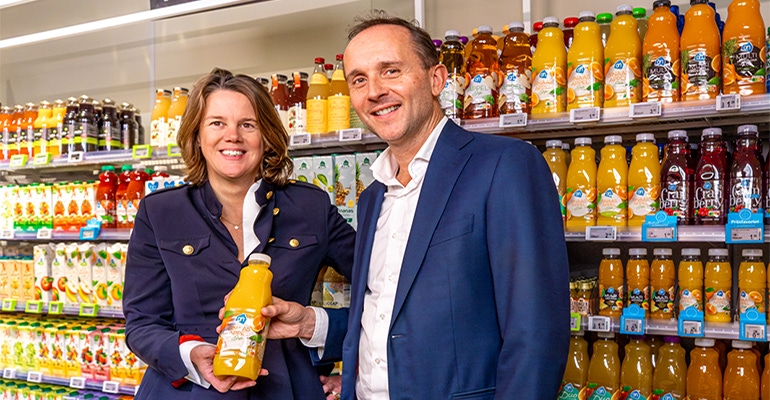Recyclable PEF Bottled Fruit Juice Headed to Retail
High-barrier fruit juice bottles made of plant-based polyethylene furanoate (PEF) biopolymer from Avantium will be sold at European retailer Albert Heijn in 2024.

A collaboration between sustainable chemistry company Avantium N.V. and Netherlands retailer Albert Heijn leverages the sustainability of Avantium's 100% plant-based and circular material PEF (polyethylene furanoate) for packaging. Refresco, the global independent beverage solutions provider for brands, will produce Albert Heijn’s new fruit juice bottle made of PEF.
Albert Heijn is the largest supermarket chain in the Netherlands and is the first in the world to introduce PEF packaging for private-label store brand products. The juices are expected to be on shelf in the second half of 2024 once Avantium's commercial plant for PEF is operational.
Avantium's PEF is a 100% plant-based and fully recyclable polymer with a wide range of applications including bottles, films, and textiles. PEF bottles like this can be recycled with PET bottles over the near term.
PEF also boasts superior barrier properties compared to PET to extend the shelf life of beverages and food.
Caroline van Reedt Dortland, Avantium’s director of communications, informed us that compared to PET…
PEF’s oxygen barrier is 10 times better;
PEF’s carbon dioxide barrier is 6 to 10 times better; and
PEF’s water barrier is twice that of PET.
“It also offers higher mechanical strength, which means that thinner PEF packaging can be produced and less resources are required,” she adds. “In combination with the plant-based feedstock to make PEF, these added functionalities give PEF all the attributes required to become the next-generation polyester.”
Avantium is currently constructing the world's first commercial plant in Delfzijl, the Netherlands, which can produce 5,000 tons of furandicarboxylic acid yearly. FDCA is the key building block for PEF.
PEF production will be further scaled up to plants of 10,000 tons’ production of FDCA and PEF yearly through technology licensing with Origin Materials.
"We are proud that Albert Heijn is the first supermarket chain to start using PEF for packaging,” says Tom van Aken, CEO, Avantium. “With Albert Heijn as a partner, Avantium can further scale up and expand the PEF value chain to meet the growing global demand for circular and renewable material solutions. This is what the materials transition is about: ensuring that consumers can access sustainable and innovative products on a commercial scale."
Retailer looking at PEF for food packaging, too.
Avantium’s van Reedt Dortland discloses that the company is working with Albert Heijn to investigate whether PEF can also be used for various other applications. That includes food packaging, which may also involve working with suppliers other than Refresco.
According to Albert Heijn CEO Marit van Egmond, the development aligns with the retailer’s mission: “Together we make eating better the easy choice. For everyone.”
“Albert Heijn wants to pass on a livable earth to future generations,” she explains. “To make that possible, one of our goals is to make packaging more sustainable. Besides reduction, recyclability and reuse, fossil-free materials are high on our wish list. With the use of PEF, we are giving substance to this."
Offers Alexander van Assouw, managing director Refresco Benelux, “as a beverage solutions provider, we are continuously looking for innovative ways to produce soft drinks, fruit juices and other drinks. Reducing, recycling, and making packaging more sustainable are [key parts] of our strategy. With PEF we can offer an alternative sustainable packaging solution to our customers. We are pleased that Refresco, Avantium, and Albert Heijn are now working together to bring this new fruit juice bottle to market.”
PEF recycling details.
Recycling for PEF is similar to PET, reports Avantium’s van Reedt Dortland.
“Recycling and trials have shown that current [PET] recycling systems are compatible with PEF, so no [additional] systems need to be developed,” she explains.
“Also, PEF can be easily distinguished from PET and other plastics with today’s optical sorting systems.
“In addition to the interim approval of PEF in mono- and multilayer bottles in Europe by the European PET Bottle Platform, the US-based Association of Plastics Recyclers included PEF in its Critical Guidance Recognition for recyclability in plastic packaging design in June 2023.
“PEF therefore fits perfectly in the circular bioeconomy,” she concludes.
You’ll find more information about PEF at PlasticsToday.
About the Author(s)
You May Also Like




